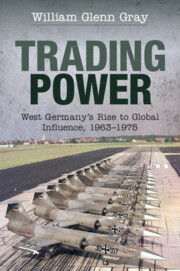Book contents
- Trading Power
- Trading Power
- Copyright page
- Contents
- Figures
- Acknowledgments
- Abbreviations
- Introduction
- 1 The Unraveling of Adenauer’s Grand Strategy (1962–1963)
- 2 America’s Junior Partner (1963–1964)
- 3 Twenty Years After (1964–1965)
- 4 The Stability Imperative (1965–1966)
- 5 Gaullist Temptations (1966–1968)
- 6 The Magnetism of Prosperity (1967–1968)
- 7 A Decisive Election (1969)
- 8 The Zenith of Ostpolitik (1970)
- 9 The European Pendulum (1970–1972)
- 10 Hazards from the Global South (1970–1972)
- 11 The Embattled Chancellor (1971–1972)
- 12 The Center of Europe (1973)
- 13 The Crisis Management Team (1973–1974)
- 14 New Structures for the West (1974–1975)
- Conclusion
- Select Bibliography
- Index
6 - The Magnetism of Prosperity (1967–1968)
Published online by Cambridge University Press: 14 October 2022
- Trading Power
- Trading Power
- Copyright page
- Contents
- Figures
- Acknowledgments
- Abbreviations
- Introduction
- 1 The Unraveling of Adenauer’s Grand Strategy (1962–1963)
- 2 America’s Junior Partner (1963–1964)
- 3 Twenty Years After (1964–1965)
- 4 The Stability Imperative (1965–1966)
- 5 Gaullist Temptations (1966–1968)
- 6 The Magnetism of Prosperity (1967–1968)
- 7 A Decisive Election (1969)
- 8 The Zenith of Ostpolitik (1970)
- 9 The European Pendulum (1970–1972)
- 10 Hazards from the Global South (1970–1972)
- 11 The Embattled Chancellor (1971–1972)
- 12 The Center of Europe (1973)
- 13 The Crisis Management Team (1973–1974)
- 14 New Structures for the West (1974–1975)
- Conclusion
- Select Bibliography
- Index
Summary
The year 1968 brought a powerful affirmation of West Germany’s uniquely stable economy and society, with ripple effects across Western and Eastern Europe. Chapter 6 opens by explaining how the Grand Coalition pursued reforms that reinforced West Germany’s commitment to price stability and economic growth. When youth protests escalated in 1967–68, driven in large part by anger over U.S. and West German policies toward Greece, Iran, and the war in Vietnam, German workers declined to join in – a stark contrast to the turmoil in neighboring France. Speculators rushed to sell French francs and buy up German marks, touching off a currency crisis. Western finance ministers converged in Bonn demanding that West Germany raise the mark’s parity value – yet Bonn refused, an unprecedented display of independence. Meanwhile, the “Prague Spring” raised hopes of West German credits for Czechoslovakia, perhaps via the Bundesbank; and German visitors poured in. When the Soviet bloc invaded, de Gaulle blamed the Bonn government for provoking it. Yet the main takeaway in Moscow was that West Germany, clearly Europe’s strongest economy, could become a significant economic partner.
Keywords
- Type
- Chapter
- Information
- Trading PowerWest Germany's Rise to Global Influence, 1963–1975, pp. 165 - 197Publisher: Cambridge University PressPrint publication year: 2022

